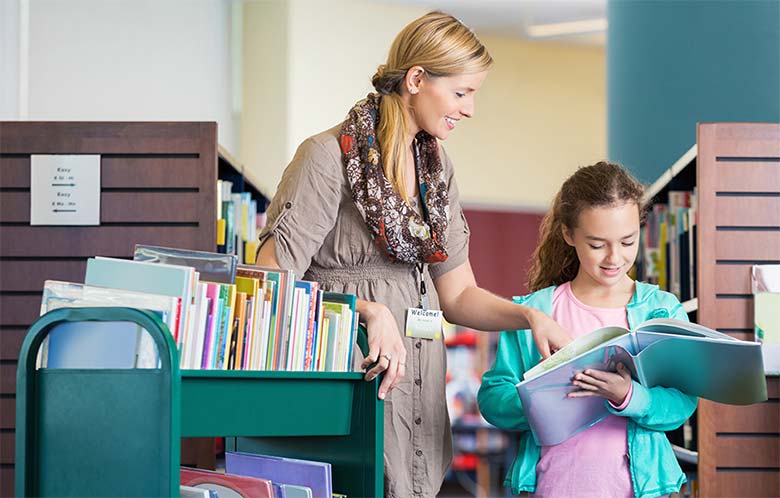As the school librarian in a busy suburban high school, I collaborate with teachers to design lessons that promote inquiry and empathy, while reinforcing the steps of the research process. My goal is to make research an innate experience for all students, borne out of their work in the school library. That process begins with my freshmen and is scaffolded up to provide seniors with a solid research and information literacy foundation to prepare them for the rigors of college and life after high school.
In previous years, freshman English Language Arts teachers would often combine a unit on poetry with a basic biography research paper. Despite using library resources to complete this assignment, the banal nature of the research paper failed to spark inquiry and left students bored and dissociated from the research process. In collaboration with the ninth grade ELA teachers, my colleagues and I designed an assignment beyond a basic biography by asking students to examine how the life experiences of a poet influenced his or her poems and writing. To promote cross curricular connections, we used the EBSCO Literary Reference Center™ Plus to choose a variety of poets to include a global perspective. The EBSCO Poetry and Short Story Reference Center™ also provides solid resources for students to begin their research. To stimulate inquiry, students were tasked with pondering the essential questions, “How can poetry reflect a poet’s life experiences? How can poetry illuminate the life of a poet?”
Once the assignment was solidified, and a schedule was created, I used digital curation tools like Symbaloo to cull relevant links and articles for students, placing emphasis on the importance of beginning academic research using databases, instead of falling down the “Google rabbit hole.” All relevant links, including a copy of the assignment, schedule and Symbaloo pages were shared with students via Google Classroom. To open the lesson, on Day One, I initiated a discussion about databases as “safe places” to locate information. Placing emphasis on the role of organization in the research process, I instructed students to create a folder in their district-issued Google Drive accounts to house all the documents related to the assignment. After modeling the search features of the EBSCO databases, including how to limit results to biographies, I asked students to spend the remainder of the period searching for biographical information about their assigned poet and sending articles to Google Drive using a productivity feature found in the “Tools” section of the database. Students continued this process for homework and annotated chosen articles in Google Docs using the comments feature guided by the questions posed on the assignment.
On Day One, I initiated a discussion about databases as “safe places” to locate information.
On Day One, I initiated a discussion about databases as “safe places” to locate information.
Due to the hybrid nature of the assignment as a means for students to dive into poetry, while also learning the steps of the research process, Day Two opened with students using NoodleTools to begin building their bibliography before moving on to the second phase of research. Students were able to easily add their articles to a new NoodleTools project by utilizing the “Direct Export to NoodleTools” feature in the EBSCO databases. To fulfill the parameters of the assignment, students were directed to search for background information about the historical period that shaped the life experiences of the assigned poet. To complete this task, students searched through articles in our collection of ABC-CLIO databases, including Pop Culture Universe, Issues: Understanding Controversy and Society and World History: The Modern Era. These articles were again easily exported to their Google Drive using the “Save” feature of the ABC-CLIO databases. As a result, students were able to continue their searches from home and begin the annotation process in Google Docs focusing on the guiding questions outlined in the assignment.
Halfway through the process on Day Three, students continued to annotate their articles and recognize gaps in their research. Day Three offered the opportunity to pause, reflect on research and conference with teachers and the librarian. At the end of the day, students used the “Cite” feature found in the ABC-CLIO databases to again export their chosen articles to NoodleTools. This day of reflection, searching and annotation, with a focus on the essential questions of the assignment, provided a segue into finding a poem that reflects the life experiences of the poet. On Day Four, students searched through the EBSCO databases and outside sources like Poets.org, The Poetry Foundation and the student-friendly search engine Sweet Search to locate a relevant poem and copy and paste it into a Google Doc. For homework, students annotated the poem guided by the framework outlined in the assignment and TP-CASTT.
Despite meeting students for the last time on Day Five, I persisted in my role in their research journey by “pushing in” and conferencing one-on-one during lunch and study hall periods. On our last research day together, I modeled how to add poem citations to a NoodleTools bibliography, noting the difference between citing websites and the ease of citing database articles. We then moved on to exporting their bibliography from NoodleTools to create a preliminary Works Cited page. The outline and notecard features of NoodleTools were also shared with students to assist them with sifting through days of annotations and narrowing down to their most relevant notes for each paragraph. Utilizing resources from the EBSCO Recipe for Research, I ended the period with a discussion about thesis statements and modeled several samples. Students were tasked with crafting their own working thesis statements over the weekend to be submitted via Google Classroom and reviewed by the teacher on Monday.
After each group of students cycled through the library to work on this assignment, I was able to reflect on the process with the ELA teachers. As a result of using high- quality database sources, students improved their writing, and the connections they formed made the assignment much more fulfilling than a basic biography report. By building the foundations for research during this step-by-step process, I can reinforce learned skills as I prepare my students for life after high school.



